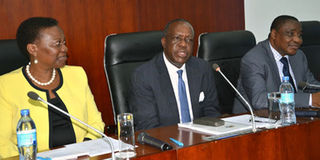TZ to spend Sh300bn on buying stake in Uganda refinery

Energy and Minerals minister Sospeter Muhongo addresses journalists in Dar es Salaam yesterday. Flanking him are the ministry’s permanent secretary Justus Ntalikwa and Ugandan Energy and Mineral Development minister Irene Muloni. PHOTO | ISSA MICHUZI BLOG
What you need to know:
- The Uganda–Tanzania oil pipeline will transport crude oil from Uganda’s oil fields to Tanga, Tanzania, a port on the Indian Ocean. The pipeline would start in Buseruka sub-county, Hoima District, in Uganda’s Western Region. It would pass through Masaka in Uganda, Bukoba in Tanzania, loop around the southern shores of Lake Victoria, continue through Shinyanga and Singida, to end in Tanga, a distance of approximately 1,410 kilometres (880 miles).
Dar es Salaam. Tanzania will spend $150.4 million (Sh300 billion) on buying 8 per cent of shares in an oil refinery to be built in Uganda.
Energy and Minerals minister Sospeter Muhongo yesterday confirmed the news that Tanzania would buy the stake in the refinery.
It is part of an agreement for all East African countries to own shares in the Ugandan refinery.
Each of the bloc’s member countries will own 8 per cent of shares in the project in line with strategies of integrating the regional economies and helping businesses to prosper. The joint ownership of the refinery will also raise investor confidence and encourage more public-private partnerships in the region.
Prof Muhongo and Ugandan Energy and Mineral Development minister Irene Muloni held a news conference in Dar es Salaam yesterday where they announced the formation of a joint technical committee to work on the initial stages of the preparation for the construction of a 1,400km pipeline from Hoima to Tanga.
The meeting was the first since Uganda and Tanzania sealed the deal last week for the pipeline that will create 10,000 direct jobs.
Kenya had hoped to snap up the deal via the Northern route to the Lamu Port at the Indian Ocean.
The project starting in Kenya’s pre-election year meant investments, jobs and other associated benefits — which undoubtedly would go to the government’s credit.
Prof Muhongo and Ms Muloni said their countries were moving fast so that the time frame set for the completion of the $3.5 billion pipeline in 2020 is met.
They also said the two countries were exploring the possibility of using the same pipeline route to set a parallel gas pipeline to transport natural gas. Tanzania has gas reserves of 57 trillion cubic feet.
Prof Muhongo said the technical team involving experts from Tanzania and Uganda was in the city to discuss structure of the project and implementation plan.
“The team of experts is holding a meeting to discuss activities for implementing this project. The team includes experts in almost all fields: economics roads and construction, land, port development, oil and gas, water resources and marine engineering,” said Prof Muhongo.
Last week, during the East African Head of States Infrastructure Summit, the agreement was concluded for Uganda to team up with Tanzania for implementation of the project, while Kenya concentrates on constructing its own crude oil pipeline to connect with Lamu port.
Both Uganda and Kenya have discovered oil reserves in Hoima and Turkana respectively with enough volumes for extraction.
Ms Muloni said Uganda was strongly committed to financing the construction of the pipeline and refinery for exporting petroleum products to other East African countries at the cost of $4.7 billion.
“We are here today to discuss the oil pipeline project structure. We call for support from communities and the media for successful implementation of this project. We have set a timeline of 2020 to complete this project. The target is to finish in the middle of 2020, but we are aiming at winding up the project before such timeline,” said Ms Muloni.
“Under the oil refinery project other East African countries will be apportioned shares. This project will be implemented through private-public partnership arrangement,” she said.
She also said after concluding the agreement Uganda was also preparing a plan for constructing a pipeline for importing natural gas from Tanzania.
“We are also discussing the option of building a gas pipeline for importing natural from Tanzania. We are aware that Tanzania has discovered a huge amount of natural gas deposits. After accomplishing this project for pumping crude oil to Tanga Port, we will embark on the project for natural gas pipeline,” she said.
Prof Muhongo further said Tanzania was also committed to implementing gas pipeline projects for exporting natural gas to East African countries, especially Kenya and Uganda.
“We are also planning to connect upcountry regions with gas pipelines. We are going to use the same pipeline planned by the Ugandan government to connect upcountry regions such as Mwanza and Kagera,” said Prof Muhongo.




